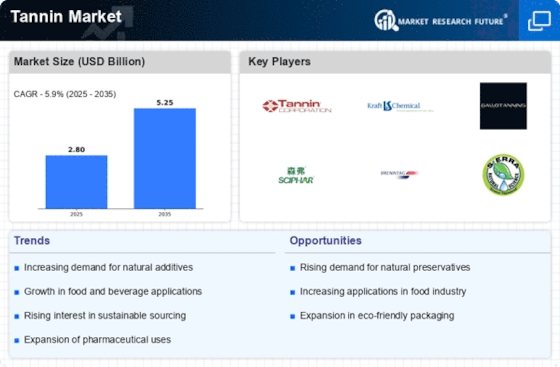Top Industry Leaders in the Tannin Market
 Tannins, natural astringent compounds found in plants, are emerging as versatile and sustainable ingredients across various industries. From their traditional use in leather tanning to their newfound applications in bioplastics, adhesives, and pharmaceuticals, the tannin market presents a fascinating tapestry of players, strategies, and evolving opportunities.
Tannins, natural astringent compounds found in plants, are emerging as versatile and sustainable ingredients across various industries. From their traditional use in leather tanning to their newfound applications in bioplastics, adhesives, and pharmaceuticals, the tannin market presents a fascinating tapestry of players, strategies, and evolving opportunities.
A Spectrum of Players Branching Out:
-
Forestry Giants: Leading the pack are established companies like Mead Westvaco Corporation (US), Borregaard AS (Norway), and Aditya Birla Group (India) with extensive forestry resources, extraction expertise, and diverse product portfolios. -
Regional Specialists: Companies like Wattle Extract Manufacturers Association (South Africa), Haining Baoling Tannin Industry Co., Ltd. (China), and Mimosa (France) cater to specific regional demands and offer specialized tannin extracts. -
Emerging Innovators: Smaller players like Tannac (Switzerland), Nature Coatings Pty Ltd. (Australia), and GreenValue (US) focus on innovative applications like bio-based plastics, nutraceuticals, and water treatment, pushing the boundaries of tannin utilization.
Strategies for a Sustainable Harvest:
-
Sustainable Sourcing: Implementing certified forestry practices, exploring alternative tannin sources like fruit wastes, and promoting responsible supply chains are crucial for long-term success and environmental responsibility. -
Innovation Focus: Developing new extraction techniques, exploring novel applications, and collaborating with research institutions drive growth and market differentiation. -
Vertical Integration: Integrating upstream tannin extraction with downstream processing and application development ensures control over quality, cost, and responsiveness. -
Strategic Partnerships: Collaborations with manufacturers in diverse industries like leather, bioplastics, and pharmaceuticals facilitate market access, tailored solutions, and joint innovation. -
Standardization and Certification: Promoting industry-wide standards and certifications for tannin quality and sustainability builds trust and opens new market opportunities.
Factors Shaping the Tannin Landscape:
-
Growing Demand for Sustainable Alternatives: Increasing consumer consciousness and regulatory pressure are driving demand for natural and biodegradable ingredients, favoring tannins over synthetic alternatives. -
Leather Industry Trends: While the traditional leather tanning market remains significant, fluctuations in demand and competition from artificial leather can impact market dynamics. -
Emerging Applications: Growing interest in bioplastics, adhesives, nutraceuticals, and water treatment creates exciting new avenues for tannin utilization. -
Technological Advancements: Innovations in extraction processes, bioconversion technologies, and characterization techniques unlock new functionalities and applications for tannins. -
Regulatory Landscape: Environmental regulations on deforestation and chemical use can influence sourcing practices and production methods.
Key Companies in the Tannin market include
Zhushan County Tianxin Medical & Chemical Co., Ltd.
Forestal Mimosa Ltd.
Tanin Sevnica D.D., S.A.
Ajinomoto Omnichem N.V
Ulrich Gmbh
Ever S.R.L
Laffort Sa
Polson Pty. Ltd.
Ucl Company (Pty) Ltd.
Tannin Corporation
Recent Developments:
-
August 2023: Mead Westvaco partners with a leading bioplastics manufacturer to develop a new tannin-based biopolymer for sustainable packaging solutions. -
September 2023: Borregaard unveils a new production facility utilizing advanced extraction techniques to increase tannin yield and purity. -
October 2023: Aditya Birla Group invests in research on utilizing fruit waste tannins for high-value applications in the pharmaceutical industry. -
November 2023: Wattle Extract Manufacturers Association collaborates with universities to develop standardized testing methods for tannin quality and composition. -
December 2023: Haining Baoling Tannin Industry Co., Ltd. partners with a leather goods manufacturer to launch a sustainable leather collection tanned with eco-friendly tannins.










